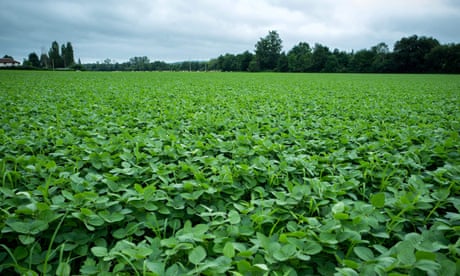Genetically modified soya beans designed to absorb light more efficiently produced a 25% greater yield in an advance that could significantly boost global food supplies. The field trials are the first successful demonstration that genetic engineering can be used to directly target the photosynthesis process in food crops. The improvements seen are almost unprecedented for this kind of intervention and would take decades to achieve through selective breeding.
The advance comes as the most recent UN food security report found that nearly 10% of the world population was hungry last year, up from 8% in 2019, and with projections that the climate crisis will lead to harsher growing conditions for crops. “This result is really relevant right now. One out of 10 people on the planet are starving.
This is the biggest health crisis on the planet,” said the director of the research project, Prof Stephen Long, of the University of Illinois at Urbana-Champaign. Soya beans are a vital food crop. Photograph: Fred Scheiber/AFP/Getty Images Long started investigating how to improve photosynthesis – the process that converts sunlight into chemical energy – more than 25 years ago.
The latest work targets genes involved in a process that plants use to shield themselves from bright sunlight, which can bleach leaves if plants absorb more energy than they can use for growth. To avoid this, plants have a protective mechanism called non-photochemical quenching (NPQ) that gets rid of excess energy through heat. In bright sunlight, quenching kicks in almost instantaneously, like a human eye contracting.
But it takes up to half an hour for the process to switch off again meaning that if a cloud passes overhead, plants are needlessly diverting energy they could be using for growth. Sign up to First Edition Free daily newsletter Archie Bland and Nimo Omer take you through the top stories and what they mean, free every weekday morning Privacy Notice: Newsletters may contain info about charities, online ads, and content funded by outside parties. For more information see our Privacy Policy .
We use Google reCaptcha to protect our website and the Google Privacy Policy and Terms of Service apply. A soya bean breeder would spend an entire career trying to get that kind of increase in yield. Prof Jonathan Jones The scientists modified three genes that allowed the soya bean plant to become more responsive to lower light conditions.
The modified soya beans had an average improved yield of 25% across five large trials, with one trial showing a boost of 33%. For comparison, selective breeding of soya beans – one of the most intensively grown crops on the planet – had led to a roughly 1% improvement in yield each year, Long said. “After years of trial and tribulation, it is wonderfully rewarding to see such a spectacular result for the team,” he added.
Prof Jonathan Jones of the Sainsbury Laboratory, a plant research institute based in Norfolk, described the results as “very impressive”. “I’m amazed how well it seems to be working in terms of actual yield,” said Jones, who was not involved in the research. “A soya bean breeder would spend an entire career trying to get that kind of increase in yield.
” The team previously demonstrated the concept in tobacco plants , but critics had questioned whether the increase in leaf growth seen in tobacco would translate to an improved yield of seeds or beans in a food crop. The team hope the latest work, published in the journal Science , will dispel lingering scepticism. “The soya bean is quite a breakthrough,” said Long.
It also suggests the approach could have wider applications, with trials planned for rice, wheat and cassava. The work is funded by the Bill & Melinda Gates Foundation, and a grant from the UK Foreign Office with a condition of funding that the technology will be made freely available to farmers in developing nations in sub-Saharan Africa and south Asia. It could also have commercial applications elsewhere, although current laws would preclude GM crops being grown commercially in the UK and EU.
Jones predicted major agricultural companies would want to license the technology. “And why not? That’s a good thing,” he said. “One would hope that there’ll be a hefty royalties that Gates can charge on this that can be ploughed back into food security research.
”.
From: theguardian
URL: https://www.theguardian.com/environment/2022/aug/18/gm-soya-beans-greater-yield-global-food-security-boost



